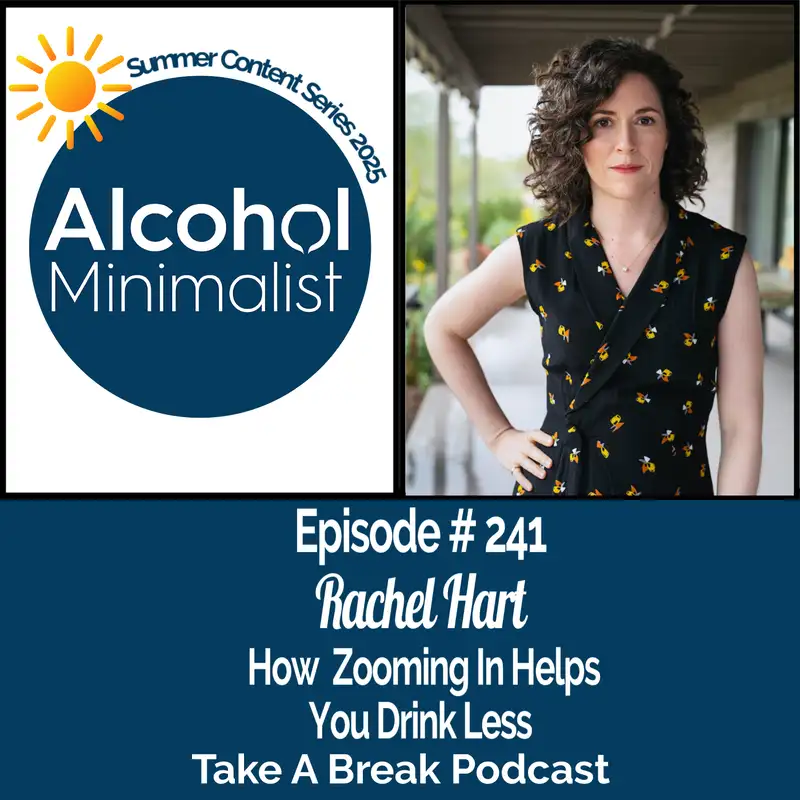Summer Content Series: How Zooming In Helps You Drink Less with Rachel Hart
In this episode of the Alcohol Minimalist podcast, Molly shares another installment in her Summer Content Series, featuring guest content from one of the most influential voices in the alcohol-reduction space—Rachel Hart, host of the “Take a Break” podcast.
Molly opens up about Rachel’s pivotal role in her own journey to change her drinking habits, describing her as the first person who helped her believe it was possible to rethink her relationship with alcohol. Through books, podcasts, and coaching, Rachel’s voice provides clarity, validation, and a methodical approach to mindful drinking that aligned closely with the Alcohol Minimalist philosophy.
This featured episode challenges one of the most common self-sabotaging thought patterns: the tendency to make absolute declarations about your identity based on drinking behavior. Statements like “I have no willpower,” “I’m just someone who can’t moderate,” or “I must have an addictive personality” are not facts—they are beliefs that shape your experience and become self-fulfilling prophecies.
Rachel teaches listeners how to stop making their drinking patterns a reflection of their identity and instead approach every off-plan moment with curiosity, not criticism. Using Rachel's “Think-Feel-Act” cycle, this episode is a science-based, compassion-forward guide to interrupting old stories and rewiring your drinking habits.
Key Topics Covered:
- Why absolute statements about identity are so damaging to behavior change
- How belief systems reinforce drinking patterns
- The Think-Feel-Act cycle and how it relates to drinking habits
- A practical approach to examining moments when we go off-plan
- How to use curiosity instead of criticism when reflecting on cravings and decisions
- The power of zooming into specific moments instead of generalizing your behavior
Why You Should Listen:
If you’re stuck in a cycle of overdrinking and self-recrimination, this episode will help you shift from judgment to awareness. Learn why your thoughts—not alcohol—are the real drivers of your behavior, and how small mindset changes can lead to major personal transformation.
If you’re stuck in a cycle of overdrinking and self-recrimination, this episode will help you shift from judgment to awareness. Learn why your thoughts—not alcohol—are the real drivers of your behavior, and how small mindset changes can lead to major personal transformation.
Mentioned in the Episode:
- Rachel Hart’s Podcast – Take a Break
- Sunnyside Drinking App – Molly’s recommended habit tracking and behavior change tool
Connect with Molly:
- Website: www.mollywatts.com
- Free Resources: Alcohol Truths 2023 eBook
- Facebook Group: Alcohol Minimalists: Change Your Alcohol Habits
Low risk drinking guidelines from the NIAAA:
Healthy men under 65:
No more than 4 drinks in one day and no more than 14 drinks per week.
Healthy women (all ages) and healthy men 65 and older:
No more than 3 drinks in one day and no more than 7 drinks per week.
No more than 3 drinks in one day and no more than 7 drinks per week.
One drink is defined as 12 ounces of beer, 5 ounces of wine, or 1.5 ounces of 80-proof liquor. So remember that a mixed drink or full glass of wine are probably more than one drink.
Abstinence from alcohol
Abstinence from alcohol is the best choice for people who take medication(s) that interact with alcohol, have health conditions that could be exacerbated by alcohol (e.g. liver disease), are pregnant or may become pregnant or have had a problem with alcohol or another substance in the past.
Abstinence from alcohol is the best choice for people who take medication(s) that interact with alcohol, have health conditions that could be exacerbated by alcohol (e.g. liver disease), are pregnant or may become pregnant or have had a problem with alcohol or another substance in the past.
Benefits of “low-risk” drinking
Following these guidelines reduces the risk of health problems such as cancer, liver disease, reduced immunity, ulcers, sleep problems, complications of existing conditions, and more. It also reduces the risk of depression, social problems, and difficulties at school or work.
Following these guidelines reduces the risk of health problems such as cancer, liver disease, reduced immunity, ulcers, sleep problems, complications of existing conditions, and more. It also reduces the risk of depression, social problems, and difficulties at school or work.

